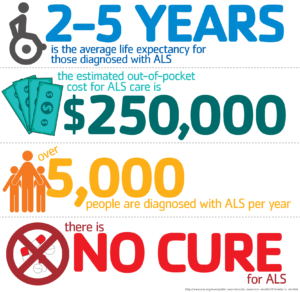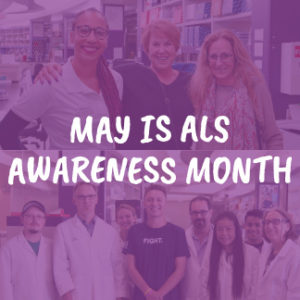Over the past decade, understanding of the multiple destructive pathways that lead to neuronal death in amyotrophic lateral sclerosis (ALS) has greatly improved. There is still no cure for ALS unfortunately with all the technology medicine has but there are therapies.
Home Care at some point in middle to beginning of late stage.
This would include a Home Health Assistant followed under a Visiting Nurse/RN with an Attending Doctor for follow up on the pt care=A whole team of medical care including as soon as needed:
PT and OT:
Physical therapy (PT) is the use of exercises and treatments to improve physical movement and overall mobility. Occupational therapy (OT) is similar but is focused on developing or maintaining the physical skills needed to perform everyday tasks. For example, a physical therapist might prescribe stretching exercises to limit discomfort and preserve range of motion or use pool therapy to help you walk and improve joint function. An occupational therapist may help you find new ways to brush your teeth or recommend equipment that can make your activities of daily living easier to perform.
Speech Therapy:
For people living with ALS with bulbar symptoms, ALS leads to speech problems when it attacks bulbar neurons. These are the nerve cells responsible for bringing messages from the lower parts of the brain (bulbar region) to the muscles that move the lips, tongue, soft palate (back of roof of mouth), jaw, and vocal folds (voice box). As nerves are lost to the disease, the muscles they control become weak and tight. This causes dysarthria-difficulty speaking). A speech-language pathologist can help with both speaking and swallowing difficulties. This may include finding devices to help you communicate as your speech becomes harder for others to understand.
Respiratory Therapy:
A respiratory therapist can teach you new techniques for breathing and coughing, helping you keep your airway and lungs clear and healthy. When mechanical ventilators are needed, they can help you evaluate the options and choose the best ventilator for your needs. An ALS diagnosis is shocking and frightening, but as with any disease, knowledge is power. Being aware of symptoms and how you can prepare for – and manage – them is key to quality of life and often, for peace of mind. The impact of ALS on breathing is one of the most daunting aspects of the disease and one for which you and your family can and should prepare for early in the ALS journey.
Psychotherapy:
Feeling sad or scared after being diagnosed with ALS is completely natural.
In time the patient with ALS has there life completed turned upside down when they need assistance with there activitities of daily living from independent in their ADLs. It’s not unusual to feel depressed or anxious after getting diagnosed with ALS. If you have difficulty coping with the mental and emotional side of ALS, a counselor or psychiatrist can help.
Potential symptoms of depression include: Prolonged feelings of sadness, hopelessness, worthlessness, anxiety, or guilt. Irritability or angry outbursts over small matters. Changes in sleeping patterns, including insomnia or sleeping too much. Changes in appetite.
Medications:
There are a number of medications that can help treat the various symptoms of ALS and new drugs are being developed all the time. Talk with your doctor or therapist to find out what is currently available and whether any such medications might be right for you.
There are currently four drugs approved by the U.S. Food and Drug Administration to treat ALS (Radicava, Rilutek, Tiglutik, and Nuedexta). Studies all over the world, many funded by The ALS Association, are ongoing to develop more treatments and a cure for ALS.
Radicava™ (edaravone)
The FDA approved Radicava™ in 2017, less than a year after Mitsubishi Tanabe Pharma America submitted a new drug application, making it the first new treatment specifically for ALS in 22 years.
Rilutek (riluzole, now generic)
This was the first FDA-approved drug available to treat ALS — in 1995. It inhibits glutamate release and prolongs life approximately three months. Riluzole is the generic name of Rilutek.
Tiglutik (thickened riluzole)
The first and only thickened liquid form of riluzole, Tiglutik was approved by the FDA in September 2018. This formulation contrasts with the oral pill form of riluzole that has been on the market for ALS for more than 20 years. It is designed to avoid potential problems of crushing tablets.
Nuedexta®
Indicated for the treatment of pseudobulbar affect (PBA), which is characterized by frequent, involuntary, and often sudden episodes of crying and/or laughing that are exaggerated and/or don’t match how you feel. PBA occurs secondary to a variety of otherwise unrelated neurologic conditions. Nuedexta® (dextromethorphan HBr and quinidine sulfate) was FDA-approved in 2011.

